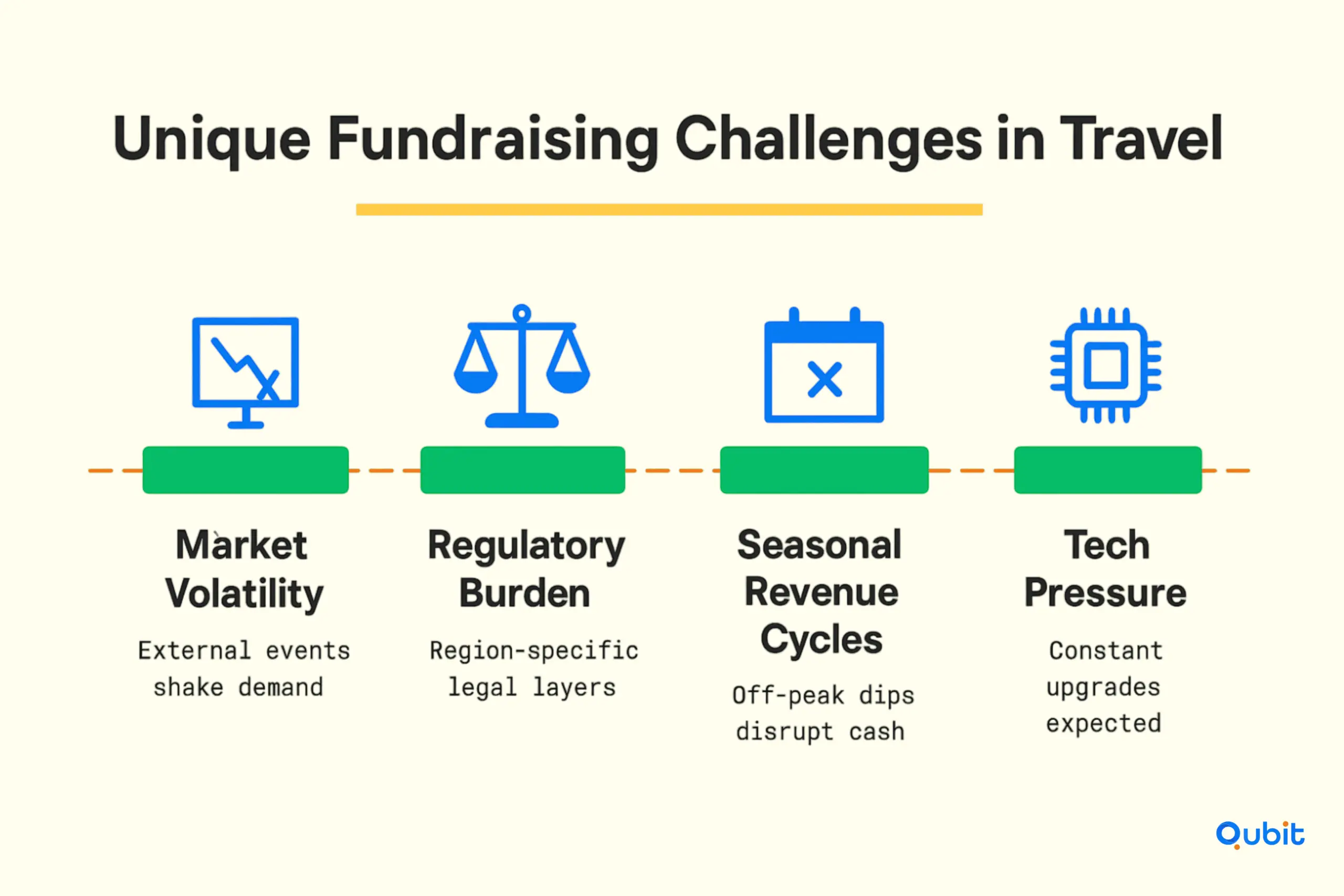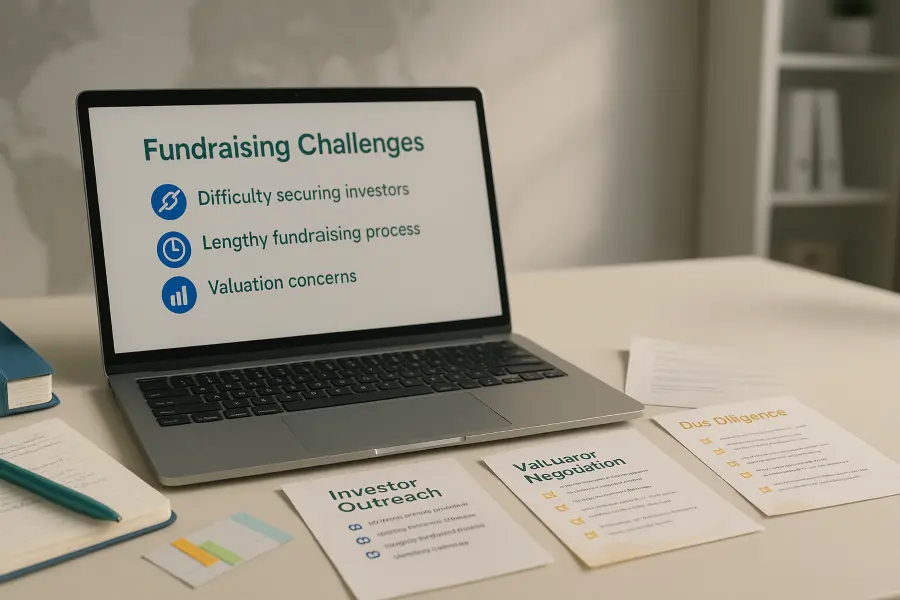Raising funds in the travel sector can feel like charting a path through turbulent skies—exciting yet filled with unexpected obstacles. Startups in this industry encounter specific challenges tied to market volatility, evolving consumer trends, and strict regulatory environments.
However, with careful planning and strategic execution, founders can successfully overcome these hurdles.
This article outlines actionable strategies to navigate fundraising challenges effectively in the travel sector, focusing on securing venture capital, angel investment, and alternative funding options.
Why Fundraising in Travel is Uniquely Challenging
The travel industry is notoriously sensitive to external disruptions, including economic shifts, geopolitical tensions, regulatory changes, and global events like pandemics. These factors create a higher perceived risk among investors, making them cautious about providing funding.

High Market Volatility: External events can rapidly alter consumer travel behavior, impacting revenue stability.
Regulatory Complexity: Travel businesses must navigate intricate legal frameworks varying across different regions.
Seasonality Issues: Travel often involves cyclical revenue, complicating financial projections.
Technology Dependence: Investors expect high innovation and seamless user experiences, requiring constant technological investments.
By understanding these hurdles, you can tailor your fundraising strategies more effectively.
Key Strategies for Navigating Fundraising Challenges
1. Build a Compelling, Resilient Business Model
Investors are more likely to fund startups demonstrating robust business models capable of withstanding market volatility. Clearly showcase how your startup addresses specific market needs, offers competitive advantages, and manages operational costs efficiently.
Highlight your business model’s resilience by detailing strategies to handle revenue dips during challenging periods. For detailed insights, refer to our comprehensive article on Travel Startup Fundraising Strategies.
2. Address Regulatory and Compliance Issues Proactively
Travel startups frequently encounter regulatory barriers, from licensing and data privacy to consumer protection laws. Demonstrating proactive compliance reassures investors by lowering perceived risks.
Ensure compliance by clearly outlining relevant laws and regulations specific to your target markets. Investors will appreciate your preparation and attention to detail. Check our dedicated guide on Legal & Regulatory Compliance in Travel Funding for deeper insights.
3. Develop Realistic, Data-Backed Financial Projections
Given the industry’s sensitivity to external factors, robust financial modeling is crucial. Investors seek startups with reliable forecasting models capable of anticipating fluctuations and strategically managing resources.
Include various scenarios: optimistic, realistic, and pessimistic, to demonstrate thorough planning and adaptability. Clearly present assumptions, including seasonality and market volatility, backing them with market data and consumer insights.
Practical Steps for Successful Fundraising in the Travel Sector
Step 1: Create an Investor-Centric Pitch
Craft your pitch around investor concerns by clearly addressing potential risks. Focus your narrative on solutions, resilience, and measurable growth potential. Include solid proof points like early customer adoption, partnerships, and technological innovation.
Step 2: Target Industry-Savvy Investors
Not all investors are equally comfortable with travel sector risks. Identify venture capitalists, angel investors, or debt financiers who understand and regularly invest in travel. These investors are often more patient, strategic, and supportive of innovation.
Step 3: Leverage Alternative Financing Models
Traditional venture capital isn't your only option. Consider funding alternatives, such as:
Revenue-based financing: Aligns repayment to your revenue cycles, making it ideal for seasonal travel businesses.
Government grants or subsidies: Often available for tech-driven travel startups, particularly those promoting sustainable tourism or digital innovation.
Crowdfunding: A viable approach to test market validation and build consumer loyalty alongside funding.
Step 4: Clearly Communicate Your Technology and Innovation Advantage
Investors prioritize travel startups showcasing cutting-edge innovation—particularly digital transformation, artificial intelligence, sustainability initiatives, or unique consumer engagement platforms. Clearly articulate how your technology differentiates you from competitors, and quantify the business benefits.
How to Mitigate Specific Fundraising Risks in Travel
Overcoming Seasonality and Market Volatility
Seasonality significantly impacts cash flow and profitability. To mitigate this:
Diversify your revenue streams across different customer segments or geographical markets.
Develop supplemental products or off-season services to stabilize revenues.
Leverage flexible funding solutions like revenue-based financing, aligning repayment obligations with actual revenue.
Addressing Regulatory Complexity
Travel regulations vary considerably across regions, impacting market entry strategies and operational costs. To reduce compliance risks:
Engage legal experts early in your funding process.
Invest proactively in compliance technologies to streamline ongoing management.
Clearly communicate your regulatory strategy to investors, showcasing your preparedness and risk mitigation approach.
Current Market Insights and Trends
Understanding current trends helps align your strategy with investor priorities. Notable trends shaping the travel funding landscape include:
Rise of Sustainable Travel: Investors increasingly favor startups focused on eco-friendly travel solutions.
Technology Integration: AI-driven personalization, blockchain for secure transactions, and augmented reality for immersive experiences are becoming investor priorities.
Post-pandemic Resurgence: Data from CB Insights reveals a significant uptick in travel-tech investment, rebounding strongly as the sector adapts post-pandemic.
Real-world Success Stories: Travel Startups That Excelled in Fundraising
Highlighting successful examples can inspire confidence in your own funding strategies:
Hopper, an app providing travel recommendations and flexible booking, raised significant funding by emphasizing predictive analytics and flexible, consumer-centric technology solutions.
GetYourGuide, a platform offering local experiences, overcame seasonal and regulatory complexities by clearly communicating their robust operational framework and scalable business model to investors.
Quick Tips for Travel Startup Founders
Clearly outline how your business model addresses specific sector risks.
Prioritize investor transparency, particularly regarding seasonality, market volatility, and regulatory concerns.
Use alternative financing creatively to supplement traditional funding channels.
Demonstrate flexibility and adaptability clearly in your financial forecasts.
Key Questions Investors Might Ask (with Brief Answers):
How will you handle revenue fluctuations from seasonal or unexpected market disruptions?
Highlight your diversified revenue streams, flexible financial planning, and contingency strategies.What specific regulatory hurdles are you facing, and how do you plan to address them?
Showcase thorough research, proactive compliance measures, and expert legal counsel supporting your operations.Why should investors trust your technology’s competitive edge in a crowded market?
Emphasize your innovation, IP protection, unique consumer value, and quantifiable competitive advantages
Conclusion
Fundraising in the travel sector requires careful navigation but offers significant rewards. By clearly demonstrating resilience, thorough preparation, and proactive risk management, your travel startup can successfully secure funding and thrive amidst uncertainty. Armed with strategic insights, realistic financial planning, and a commitment to innovation, you'll effectively position your startup as a compelling investment opportunity.
If you’re ready to integrate robust compliance measures into your funding strategy and secure lasting investment partnerships, our team at Qubit Capital can guide you every step of the way.
Key Takeaways
- Travel startups face high investor skepticism due to market volatility, regulatory hurdles, and seasonal revenue cycles.
- Building a resilient, investor-centric business model with clear compliance strategies is critical to attracting funding.
- Robust, data-backed financial projections—especially with best-case and worst-case scenarios—strengthen fundraising efforts.
- Founders should target travel-savvy investors and explore alternative financing like revenue-based models or grants.
- Highlighting tech innovation and sustainable travel trends can significantly boost investor interest in this sector.
Frequently asked Questions
How long does it typically take to secure travel-related funding?
Timelines vary widely, ranging from three months to over a year. Factors include investor interest in your niche, market conditions, and regulatory hurdles. Planning a realistic schedule with interim goals helps maintain focus and communication with stakeholders.


 Back
Back



